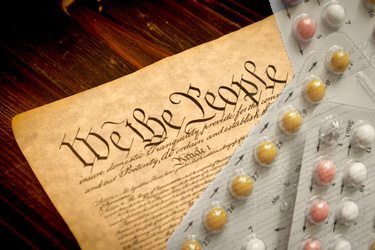Appeals on Contraception Mandate Reach Supreme Court
Two separate requests to hear challenges to the contraception mandate were filed Thursday, increasing the odds the Supreme Court will rule on the issue in June.

On Thursday, the Supreme Court received two separate requests to rule on the constitutionality of the contraception mandate in the Affordable Care Act, making it all but certain the nation’s highest court will step into the birth control fight later this year.
The Obama administration filed an appeal asking for a review of the Tenth Circuit Court of Appeals decision in the Hobby Lobby case. The government raises only one issue in its petition: whether the Tenth Circuit erred when it struck down the mandate as a violation of the Religious Freedom Restoration Act (RFRA), avoiding the broader question, pushed by conservatives challenging the mandate, of whether or not the First Amendment protects businesses from complying as well.
In a separate appeal, the nonprofit Christian legal group the Alliance Defending Freedom (ADF) asked the high court to review a different ruling from the Third Circuit Court of Appeals. That decision held that the RFRA did not prevent a Mennonite-owned company from complying with the mandate. In its appeal of the Third Circuit decision, lawyers from ADF argue more broadly that in addition to violating its rights under the RFRA, the contraception mandate also impinges on First Amendment rights of the business, the Conestoga Wood Specialties Corporation, and its owners.
The appeals were expected in many ways. Religious conservatives have used the contraception mandate to argue for an expansion of religious liberties, including religious exercise rights for secular, for-profit corporations. Relying on precedent from Citizens United v. Federal Election Commission, opponents of the mandate argue that where the RFRA fails to protect businesses from having to comply with the mandate, the First Amendment does protect them. “The United States government is taking the remarkable position that private individuals lose their religious freedom when they make a living,” said Kyle Duncan of the Becket Fund for Religious Liberty, which represents Hobby Lobby in its challenge to the mandate, in a statement.
But the Obama administration counters that the RFRA was never designed to be a “sword to deny employees of for-profit commercial enterprises the benefits and protections of generally applicable laws.” Furthermore, the administration argues, a secular for-profit company is not a vehicle for its owners’ religious beliefs and, therefore, does not deserve the same legal protections of religious rights as do individuals.
In addition to the decisions in the Tenth Circuit and Third Circuit, earlier this week the Sixth Circuit Court of Appeals sided with the Obama administration and ruled a for-profit manufacturing firm, Autocam Corporation, must comply, putting its decision in line with the decision from the Third Circuit. This conflict in the appellate courts, and the timing of Thursday’s appeals makes it a near certainty the Supreme Court will take up the issue this term. That would mean a ruling on the constitutionality of the mandate and the extent to which for-profit businesses can assert First Amendment religious rights would come this June.
